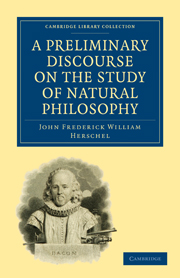Book contents
- Frontmatter
- Contents
- Dedication
- PART I OF THE GENERAL NATURE AND ADVANTAGES OF THE STUDY OF THE PHYSICAL SCIENCES
- PART II OF THE PRINCIPLES ON WHICH PHYSICAL SCIENCE RELIES FOR ITS SUCCESSFUL PROSECUTION, AND THE RULES BY WHICH A SYSTEMATIC EXAMINATION OF NATURE SHOULD BE CONDUCTED, WITH ILLUSTRATIONS OF THEIR INFLUENCE AS EXEMPLIFIED IN THE HISTORY OF ITS PROGRESS
- CHAP. I Of Experience as the Source of our Knowledge. — Of the Dismissal of Prejudices. — Of the Evidence of our Senses
- CHAP. II Of the Analysis of Phenomena
- CHAP. III Of the State of Physical Science in General, previous to the Age of Galileo and Bacon
- CHAP. IV Of the Observation of Facts and the Collection of Instances
- CHAP. V Of the Classification of Natural Objects and Phenomena, and of Nomenclature
- CHAP. VI Of the First Stage of Induction. — The Discovery of Proximate Causes, and Laws of the lowest Degree of Generality, and their Verification
- CHAP. VII Of the higher Degrees of Inductive Generalization, and of the Formation and Verification of Theories
- PART III OF THE SUBDIVISION OF PHYSICS INTO DISTINCT BRANCHES, AND THEIR MUTUAL RELATIONS
- Index
CHAP. I - Of Experience as the Source of our Knowledge. — Of the Dismissal of Prejudices. — Of the Evidence of our Senses
Published online by Cambridge University Press: 29 August 2010
- Frontmatter
- Contents
- Dedication
- PART I OF THE GENERAL NATURE AND ADVANTAGES OF THE STUDY OF THE PHYSICAL SCIENCES
- PART II OF THE PRINCIPLES ON WHICH PHYSICAL SCIENCE RELIES FOR ITS SUCCESSFUL PROSECUTION, AND THE RULES BY WHICH A SYSTEMATIC EXAMINATION OF NATURE SHOULD BE CONDUCTED, WITH ILLUSTRATIONS OF THEIR INFLUENCE AS EXEMPLIFIED IN THE HISTORY OF ITS PROGRESS
- CHAP. I Of Experience as the Source of our Knowledge. — Of the Dismissal of Prejudices. — Of the Evidence of our Senses
- CHAP. II Of the Analysis of Phenomena
- CHAP. III Of the State of Physical Science in General, previous to the Age of Galileo and Bacon
- CHAP. IV Of the Observation of Facts and the Collection of Instances
- CHAP. V Of the Classification of Natural Objects and Phenomena, and of Nomenclature
- CHAP. VI Of the First Stage of Induction. — The Discovery of Proximate Causes, and Laws of the lowest Degree of Generality, and their Verification
- CHAP. VII Of the higher Degrees of Inductive Generalization, and of the Formation and Verification of Theories
- PART III OF THE SUBDIVISION OF PHYSICS INTO DISTINCT BRANCHES, AND THEIR MUTUAL RELATIONS
- Index
Summary
(66.) Into abstract science, as we have before observed, the notion of cause does not enter. The truths it is conversant with are necessary ones, and exist independent of cause. There may be no such real thing as a right-lined triangle marked out in space; but the moment we conceive one in our minds, we cannot refuse to admit the sum of its three angles to be equal to two right angles; and if in addition we conceive one of its angles to be a right angle, we cannot thenceforth refuse to admit that the sum of the squares on the two sides, including the right angle, is equal to the square on the side subtending it. To maintain the contrary, would be, in effect, to deny its being right angled. No one causes or makes all the diameters of an ellipse to be bisected in its centre. To assert the contrary, would not be to rebel against a power, but to deny our own words. But in natural science cause and effect are the ultimate relations we contemplate; and laws, whether imposed or maintained, which, for aught we can perceive, might have been other than they are. This distinction is very important. A clever man, shut up alone and allowed unlimited time, might reason out for himself all the truths of mathematics, by proceeding from those simple notions of space and number of which he cannot divest himself without ceasing to think.
Information
- Type
- Chapter
- Information
- Publisher: Cambridge University PressPrint publication year: 2009First published in: 1830
